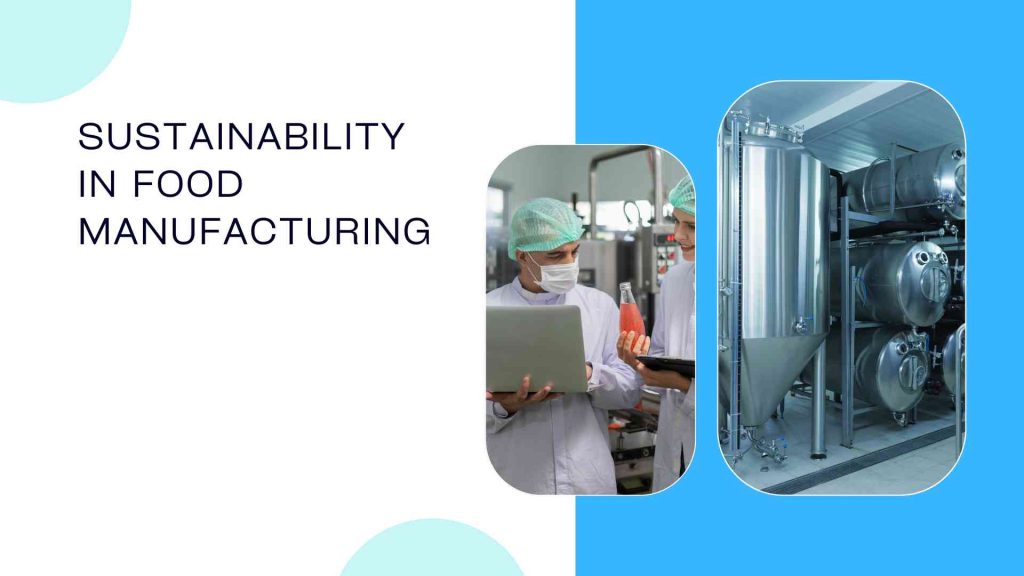Sustainability has become a critical focal point in today’s world, and the food manufacturing industry is no exception. As global populations rise and environmental challenges intensify, the need for sustainable practices in food manufacturing has never been more pressing. This article delves into sustainability in food manufacturing, exploring its significance, key principles, and innovative approaches to ensure a greener and more prosperous future for all.
The Significance of Sustainability in Food Manufacturing
Food manufacturing plays a pivotal role in the global food supply chain, making it essential to address its environmental and social impacts. Sustainability in this context encompasses three key dimensions: environmental, economic, and social. Let’s examine each dimension in more detail:
Environmental Sustainability
- Resource Conservation: Sustainable food manufacturing aims to reduce the consumption of finite resources, such as water, energy, and raw materials. This involves optimizing production processes, reducing waste, and adopting renewable energy sources.
- Pollution Prevention: Minimizing the release of harmful pollutants into the environment, such as greenhouse gases and chemical waste, is crucial. Sustainable practices often involve using eco-friendly packaging, reducing emissions, and implementing waste recycling programs.
- Biodiversity Preservation: Sustainable food manufacturing acknowledges the importance of maintaining ecosystems and biodiversity. Responsible sourcing of ingredients and reducing deforestation are examples of how companies contribute to biodiversity preservation.
Economic Sustainability
- Cost Efficiency: By reducing resource consumption and waste, companies can lower operational costs, improving long-term profitability.
- Market Demand: As consumers become more environmentally aware, there’s a growing market for sustainably grown food products. Companies that embrace sustainability can tap into new markets and gain a competitive edge.
- Risk Mitigation: Companies that integrate sustainability into their operations are better equipped to adapt to regulatory changes and supply chain disruptions, thus reducing business risks.
Social Sustainability In Food Manufacturing
- Ethical Practices: Ensuring fair wages and safe working conditions for employees is a crucial aspect of social sustainability. Ethical sourcing of ingredients also plays a role in promoting social responsibility.
- Community Engagement: Encountering with local communities and endowing initiatives that enhance their well-being can help build positive relationships and goodwill.
- Food Security: Sustainable food manufacturing contributes to food security by promoting responsible resource management and reducing food waste.
Key Principles of Sustainability in Food Manufacturing
- Supply Chain Transparency: Traceability and transparency in the supply chain are fundamental for identifying areas where sustainability improvements can be made. This includes knowing the ingredients’ origin, production methods, and transportation.
- Resource Efficiency: Optimizing resource use is central to sustainability. This involves minimizing water consumption, energy use, and raw material waste throughout manufacturing.
- Waste Reduction: Implementing strategies to reduce, reuse, and recycle waste benefits the environment and cuts operational costs. This can include composting organic waste or repurposing by-products.
- Sustainable Sourcing: Responsible sourcing of ingredients ensures that raw materials are produced with minimal environmental impact and adhere to ethical labor practices.
- Energy Efficiency: Changing to renewable energy sources and executing energy-efficient technologies can significantly reduce the carbon footprint of food manufacturing facilities.
- Green Packaging: Sustainable packaging materials and design can assist in decreasing waste and minimizing the environmental impact of packaging.
Innovative Approaches to Sustainable Food Manufacturing
- Plant-Based and Alternative Proteins: The development of plant-based and alternative protein sources is revolutionizing the food industry. These products have a lower environmental footprint compared to traditional animal-based proteins.
- Precision Agriculture: Using IoT sensors, data analytics, and automation, precision agriculture optimizes crop production, reducing resource use and environmental impact.
- Circular Economy: Adopting a circular economy approach involves creating products and procedures to minimize waste and keep materials in use for as long as possible.
- 3D Printing Food: 3D printing technology can create customized food products, reducing waste and enabling efficient use of ingredients.
Sustainability in food manufacturing is not just a trend; it’s necessary for our planet’s and future generations’ well-being. Companies in the food industry must embrace sustainable practices to reduce their environmental impact, improve economic viability, and promote social responsibility. By adhering to key principles and embracing innovative approaches, the food manufacturing industry can contribute significantly to a greener and more sustainable future. It is a collective responsibility to ensure that the food we produce and consume today leaves a positive legacy for tomorrow.
Acumatica ERP can enhance Sustainability in Food Manufacturing.
Acumatica ERP can significantly enhance sustainability in food manufacturing by providing a comprehensive platform for resource management, process optimization, and data-driven decision-making. With real-time visibility into supply chain operations, Acumatica enables companies to minimize waste, reduce energy consumption, and streamline production processes, ultimately reducing environmental impact.
Acumatica cloud ERP empowers food manufacturers to make informed choices that promote responsible sourcing and sustainable practices by tracking and analyzing ingredient sourcing, transportation, and production data. Additionally, the system’s automation capabilities can help minimize errors, reduce paper usage, and enhance overall operational efficiency, contributing to economic and environmental sustainability in the food manufacturing industry. Contact us for a customized ERP.

Sangeetha brings 20 years of experience in Information Technology which includes Solution architecting, building micro services, research, and evaluation of business applications, integrating apps.

